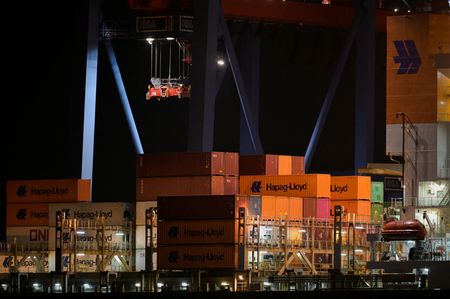(Reuters) -U.S. President Donald Trump has backed away from a threat to impose 50% tariffs imminently on imports from the European Union, giving more time for talks between Washington and the 27-nation bloc to produce a deal.
Economically, both sides have much at stake.
The United States was the trading bloc’s biggest export partner in 2024, making up 20.6% of exports, according to Eurostat.
Medicinal and pharmaceutical products were the EU’s most exported sector to the U.S in 2024, followed by motor vehicles and aircraft and associated equipment, the data showed.
The three largest exporters to the United States in the EU were Germany, which exported 161 billion euros ($182.62 billion) worth of goods, Ireland, at 72 billion euros, and Italy, at 65 billion euros.
Below is an overview of the biggest EU exports to the U.S. by sector:
MEDICATION AND PHARMACEUTICALS
The EU exported pharmaceutical products and medicaments worth around 120 billion euros to the U.S. in 2024, according to Eurostat data.
Although the Trump Administration initially spared pharmaceutical products from the reciprocal tariffs he announced on what he called “Liberation Day”, it was not immediately clear if the industry would continue to be shielded.
Some of the EU’s biggest pharmaceutical companies are
– Novo Nordisk
– Bayer
– Roche
– Novartis
AUTOMAKERS
EU countries export around 750,000 vehicles a year to the U.S., according to consulting firm AlixPartners.
Worth around 40 billion euros, this accounts for 14% of the EU auto industry’s total output in terms of volume, and 24% in terms of value as most cars exported to the U.S. are premium models.
As a result, the U.S. was the second largest market for EU car exports in 2024 in terms of value, data from auto industry group ACEA shows.
Mercedes-Benz, Stellantis and Volvo Cars are among automakers who have withdrawn their 2025 financial guidance, citing the uncertainty caused by U.S. trade policy.
Germany’s Volkswagen Group is highly exposed to the tariffs, as its premium brand Audi does not manufacture in the U.S., though it has said it plans to announce a location to build some of its best-selling models in the market this year.
AIRCRAFT AND AIRCRAFT EQUIPMENT
Toulouse-based Airbus is France’s second-biggest exporter and delivers some 12% of its jets to the United States, some of which are assembled locally, according to Cirium data.
Among the biggest suppliers to Airbus and Boeing is CFM International, the world’s largest engine maker by volume, co-owned by France’s Safran, and GE Aerospace.
ENGINES, MOTORS AND MOTOR VEHICLE PARTS
The European Union also delivers car parts and engines into the U.S.. Companies that could be affected by tariffs include MTU Aero Engines, which manufactures military aircraft engines and repairs and maintains commercial engines.
European companies manufacturing car parts, including engines and motors:
– Steyr Motors
– MTU Aero Engines
– DEUTZ
ALCOHOL
Of the alcoholic beverages worth around 9 billion euros that the EU supplies to the U.S., European spirits made up 2.9 billion euros in 2024, according to trade group spiritsEurope.
U.S. spirits companies are also invested in Europe and throughout the sector’s supply chain, meaning any tariff damage to them puts jobs at risk beyond the European Union, SpiritsEurope had told Reuters in March.
Some of the biggest European alcohol producers include:
– Dutch brewer Heineken
– British spirits maker Diageo, owner of many European brands
– Beer maker Carlsberg
COSMETICS
Exports of perfumes, essential oils, cosmetics, and toiletries to the United States were worth $10.47 billion in 2024, according to the United Nations Comtrade database.
Of this, French cosmetics exports to the U.S., from companies such as L’Oreal, reached about 2.5 billion euros per year.
LUXURY
The sector’s largest groups sell roughly a quarter of their products to U.S. consumers, while exposure among smaller brands varies, from 14% at outerwear company Moncler to 46% at sandals-maker Birkenstock.
France’s luxury industry – the world’s largest – employs over 600,000 people, data from the economy ministry shows.
Italy, which produces most of the world’s high-end leather goods, is also highly exposed to international trade.
The two countries are the largest exporters of most luxury products to the United States.
S&P analysts cited the luxury sector in a note as one of those most exposed to U.S. tariffs, as companies have only limited ability to move production to the United States.
($1 = 0.8816 euros)
(Compiled by Javi West Larrañaga and Marleen Kaesebier in Gdansk; additional reporting by Simon Ferdinand Eibach; Editing by Nick Zieminski and Barbara Lewis)











